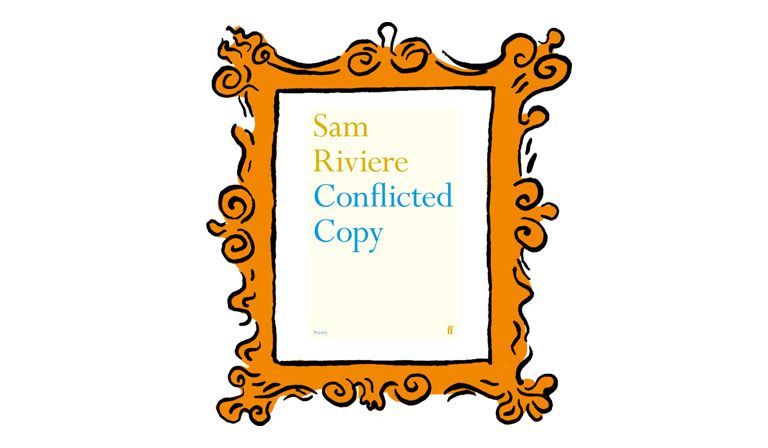Is Sam Riviere’s fourth poetry collection, Conflicted Copy, to be trusted? Its first word is “True”. But its second word, oddly, is “PDF”. And together these form the title of its first poem:
A picture-book filled entirely
with text, a soft blue font, white
ink and yellow borders, a simple
grid, a few lines on each page – a
gentle voice, singing as it speaks.
Is this a self-description? It opens a paperback with a cream, yellow and blue cover, published by Faber & Faber, home of such famous poets as TS Eliot, Sylvia Plath and Seamus Heaney—a publisher, that is, with high standards. Final proofs sent to print, approved by an editor, would be a “true PDF”.
A conflicted copy, however, occurs when a document is edited by more than one user. And someone seems to have introduced disagreements here. How can a picture-book be “filled entirely / with text” and yet also only have “a few lines on each page”? How can a font be blue if the ink is white? This is not the sleeves-up realism of a Heaney, opening his first book with the “clean rasping sound / When the spade sinks into gravelly ground”. Someone owes us an explanation.
All we get is an author’s note: “This manuscript was composed from December 2020 to January 2021, using Generative Pre-trained Transformer 2 (GPT-2)”. “Manuscript”—from the Latin for “written by hand”—feels somewhat ironic here, but otherwise this appears to be a true confession. It doesn’t mean that Conflicted Copy is the first AI-generated poetry collection—a quick Amazon search confirms there are already unsold heaps of these. But it does mean Riviere was an early adopter. Most of the AI poetry out there was made with GPT-3 or -4 (which, last year, gave us ChatGPT). GPT-2 was a less sophisticated precursor of these neural networks, which are now hoovering up the internet as they attempt to become fluent in all human knowledge. The GPT-2 “large language model” was trained mainly on unpublished books and Reddit social network pages.
As noted on its release in 2019, GPT-2 sometimes struggled with “long-term coherence” when answering user prompts. Incoherence can already be glimpsed in the imagery of “True PDF”, but the pleasing hints of a traditional lyric music, “singing as it speaks”, mellow the overall effect (notice how “picture-book”, “soft blue font”, “simple / grid”, and “gentle voice” all ride the same rhythmic see-saw). The poems of Conflicted Copy, however, get incrementally longer, eventually filling the page, and the poetic mask of the “gentle voice” starts to glitch more often.
Inspired by the Noughties American avant-garde movement known as “Flarf”, Riviere’s process-driven, laptop poetry derives its textures from algorithmic imperfection. His previous collection, After Fame (2020), used Google Translate to generate versions of the Latin poetry of Martial. The results, he found, were “rich with pathos and ruinous comedy” from “the lossy edges of internet imperialism”. Similarly, his second book, Kim Kardashian’s Marriage (2015), was composed as a patchwork of Google searches (“This is an all-out onslaught / that very much lives up to the tech spec”).
Is this “genuine poetry”, though, or “fauxetry”? These words come from Riviere’s debut novel Dead Souls (2021), an ice-cold satire on contemporary publishing, in which a new plagiarism machine finds a poet guilty of unoriginality. In despair, the poet deletes all his work, only to realise that, in the digital age, “ghostly older versions” will live forever online, “out of reach, like spots on a mirror”. Conflicted Copy is a kind of mirror volume to Dead Souls, making lyric poetry out of language as dreamily vague as the realist prose of the novel is sardonically precise, its italics buzzing away at cliches such as “genuine poetry” like a dentist’s drill at carious teeth.
Another lover of such wry italics was Roland Barthes, whose still-brilliant essay from 1967, “The Death of the Author”, illuminates a lot of what Riviere is about. In traditional literary criticism, wrote Barthes, the Author is “thought to nourish the book” with a deeper meaning. But writing, he argued—prophesying ChatGPT—is many-voiced, “a tissue of quotations drawn from the innumerable centres of culture”.
The writer’s art nevertheless lives on at the heart of this weaving. It’s not clear exactly how Riviere wrote these poems, but their titles suggest prompts that combined elements of his own previous works, e.g. “After Souls”. He then evidently introduced line-breaks to inflect the bland sentences of the computer’s responses with strange counter-rhythms. The “conflicted copy” that results is by turns funny, horrible, awkward, boring, beautiful. AI will never write genuine poetry unaided, because it has no feeling for language. But Riviere does, and his fine-tuning of the machine’s hallucinations deepens the uncanny valley of robotic profundity (“I want the night to / take a step further than night”).
I asked ChatGPT, with its GPT-4 underpinnings, to write me a final sentence here, which it instantly did, with thesaurus-like slickness. I won’t quote it because it’s too boring; the literary interest of AI diminishes by the day. The Turing Test predicted that computers would simulate humans convincingly not when they could speed-write a sonnet on request, but when they responded: “Count me out on this one. I never could write poetry.” Conflicted Copy preserves a moment when they accidentally did, with sentences that swerve between waking life and dreams: “All that’s left is to save your / document by placing the mouse cursor / inside a closed room”.
Sam Riviere and the poetry of AI
Will ChatGPT actually become less artistically interesting as it becomes more technologically sophisticated?
June 06, 2024









